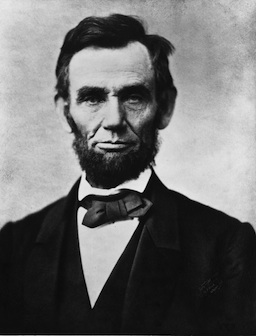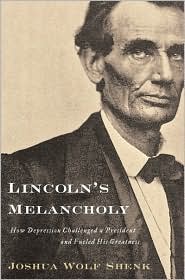
I have the great pleasure of knowing one of the foremost authorities on Abraham Lincoln … Joshua Wolf Shenk. When I stumbled across his Atlantic article about Lincoln’s depression, I wrote to him right away, not expecting a response. But the kind and accomplished writer not only wrote back, he also agreed to read my manuscript at the time, “Beyond Blue,” and write an endorsement for it, as well as provide endless inspiration and encouragement for my writing.
I feel like Josh is somewhat of a kindred spirit to me for lots of reasons. First, he was born in Ohio just 12 days before me. But more importantly, we both watched way too much “Brady Bunch” growing up. In fact, the only real criticism of my book was that I confused Marsha and Peter in the episode of the broken vase. Thank God he caught that before we went to print!
I urge all of you to check out his amazing book, “Lincoln’s Melancholy,” because it is full of instructions on how best to harness your own depression and it’s packed full of hope. I constantly remind myself of Josh’s book when I start fretting that my meds may someday not work, and how I will implement the tools Lincoln used to transform his pain into gifts for the greater good.
For starters, check out Josh’s article, “Lincoln’s Great Depression,” published in October of 2005. I have excerpted just two paragraphs below. And, again, for all of you who have read “Lincoln’s Melancholy,” it is a wonderful and inspiring read. Thanks Josh!

Lincoln did suffer from what we now call depression, as modern clinicians, using the standard diagnostic criteria, uniformly agree. But this diagnosis is only the beginning of a story about how Lincoln wrestled with mental demons, and where it led him. Diagnosis, after all, seeks to assess a patient at just a moment in time, with the aim of treatment. But Lincoln’s melancholy is part of a whole life story; exploring it can help us see that life more clearly, and discern its lessons. In a sense, what needs “treatment” is our own narrow ideas–of depression as an exclusively medical ailment that must be, and will be, squashed; of therapy as a thing dispensed only by professionals and measured only by a reduction of pain; and finally, of mental trials as a flaw in character and a disqualification for leadership.
Throughout its three major stages–which I call fear, engagement, and transcendence–Lincoln’s melancholy upends such views. With Lincoln we have a man whose depression spurred him, painfully, to examine the core of his soul; whose hard work to stay alive helped him develop crucial skills and capacities, even as his depression lingered hauntingly; and whose inimitable character took great strength from the piercing insights of depression, the creative responses to it, and a spirit of humble determination forged over decades of deep suffering and earnest longing.
Click here to continue reading.
* Click here to subscribe to Beyond Blue and click here to follow Therese on Twitter and click here to join Group Beyond Blue, a depression support group. Now stop clicking.

